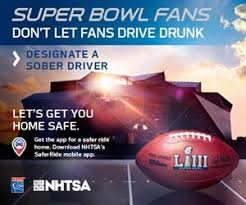 As Super Bowl LIII quickly approaches, the U.S. Department of Transportation’s National Highway Traffic Safety Administration is teaming up with The Boone County Traffic Safety Partnership to remind football fans that designated drivers are the best defense against the dangers of drunk driving. Super Bowl is a festive night in homes and bars across America, but if your night involves alcohol, plan for a sober ride home. We want to remind everyone that Fans Don’t Let Fans Drive Drunk.
As Super Bowl LIII quickly approaches, the U.S. Department of Transportation’s National Highway Traffic Safety Administration is teaming up with The Boone County Traffic Safety Partnership to remind football fans that designated drivers are the best defense against the dangers of drunk driving. Super Bowl is a festive night in homes and bars across America, but if your night involves alcohol, plan for a sober ride home. We want to remind everyone that Fans Don’t Let Fans Drive Drunk.“The Super Bowl should be a night of fun, so we want our community folks to plan safe rides home if they plan to be out at a party,” said Boone County Deputy Marc Mitalski. “Even one drink can impair judgement. You should never put yourself, or others, at risk because you made the choice to drink and drive. For most, even one drink can be one too many.”
Safety should be your number one priority: When it’s time to leave the party, make sure your designated driver is actually sober. If he or she decided to drink, you should call a cab, use the SaferRide app, or call someone else who you know hasn’t been drinking. Remember that walking impaired can also be dangerous, so designate a sober friend to walk home with you if needed. If you are driving, remember that sober driving isn’t the only law that should be
followed: Make sure you—and your driver—wear your seat belts. It’s your best defense in a crash.
If you’re planning on being the designated driver, refrain from drinking alcohol—it’s that simple. People are relying on you. While at the party, enjoy the food, the company, and non-alcoholic drinks. Encourage other designated drivers on social media using the hashtag #designateddriver. Let @NHTSAgov know you are the #DesignatedDriver so we can add your name to the Wall of Fame. Your positive influence could help keep other sober drivers on the right track. If someone you know has been drinking and tries to drive, take their keys and help them get home safely. Even if they make a fuss in the moment, they’ll thank you later.
If you’re hosting this year’s Super Bowl party, prepare plenty of snacks and non-alcoholic beverages for your guests and the designated drivers. Don’t forget to tweet your designated driver’s name to @NHTSAgov to add their name to the Wall of Fame, and use the hashtag #designateddriver. They are doing everyone a favor by keeping drunk drivers off the roads. Ask your guests to designate their sober drivers in advance, or help them coordinate with other partygoers’ designated drivers. Encourage your drinking guests to pace themselves, to eat food, and to drink plenty of water. Another important reminder: Do not serve alcohol to minors. If an underage person drinks and drives, the person who provided the alcohol could be held liable for any damage, injury, or death caused by the underage driver. In fact, you could face jail time if you host a party where alcohol is served to people under the age of 21.
Before you head out, make a game plan that includes a sober driver—someone who will not drink at all, and who will safely bring you home. Follow these simple tips for a safe and happy evening:
Remember that it is never okay to drink and drive. Even if you’ve had only one alcoholic beverage, designate a sober driver or plan to use public transportation or a ride sharing service to get home safely.
Download NHTSA’s SaferRide mobile app, available on Google Play for Android devices:
(https://play.google.com/store/apps/details?id=com.nhtsa.SaferRide&hl=en), and Apple’s iTunes Store for iOS devices:
(https://itunes.apple.com/us/app/saferride/id950774008?mt=8). SaferRide allows users to call a taxi or a predetermined friend, and identifies the user’s location so he or she can be picked up.
Use your community’s sober ride program.
If you see a drunk driver on the road, contact your local law enforcement agency.
Have a friend who is about to drink and drive? Take the keys away and make arrangements to get your friend home safely.
It is illegal everywhere in America to drive with a blood alcohol concentration of .08 or higher. Even still, thousands die each year in drunk-driving-related crashes. In 2017, there were 10,874 people killed in drunk-driving crashes. The costs can be financial, too: If you’re caught drinking and driving, you could face jail time, lose your driver’s license and your vehicle, and pay up to $10,000 in attorney’s fees, fines, car towing and repairs, higher insurance rates, and lost wages.
For more information on the dangers of drunk driving, visit www.trafficsafetymarketing.gov.
